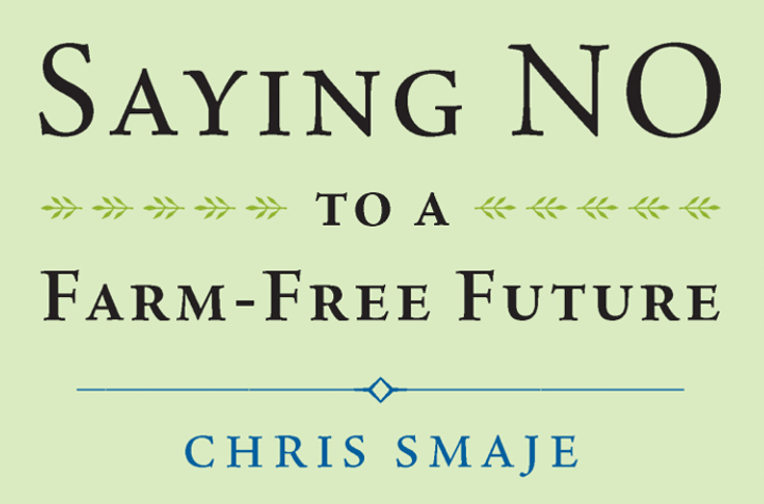I’ll be in discussion with Vandana Shiva about ‘The War on Farming’ at an event in London next Tuesday. Come along if you can. Should be an interesting conversation. There’s certainly plenty to talk about, because it does seem to me there’s quite a concerted media effort underway to point the finger at farmers and farming as the culprits for climate change and biodiversity loss.
I’ll write something about the biodiversity side of it another time. Regarding climate, the issue of ruminant methane emissions sucks the air out of more important questions, such as transitioning to low-energy agrarian localism. When people say that stopping farming animals is the “number two or equal number one” priority to leaving fossil fuels in the ground, I think we can probably call it climate science denial. There’s a lot of it around right now.
Much less prominent in the current news chatter are the shocking recent climate change events and indicators (and, for that matter, humanity’s shocking inability not to keep using more fossil fuels year on year). It seems like severe climate effects are kicking in earlier and at lower levels of warming than have generally been expected.
If governments were equal to present challenges they’d declare a proper climate emergency and start taking radical and immediate action to bring down atmospheric greenhouse gas levels. Part of that would doubtless include cutting farmed ruminants in some places. It would have to be done carefully, with a close eye on the local and wider consequences, because these could easily lead to minimal or even negative climate results. The level of understanding around ruminant methane generally shown in public debate doesn’t augur well.
But cutting farmed ruminants is a small piece of the jigsaw. Without also and much more importantly paring fossil fuel use only to what’s critical in the short-term to keep people fed and healthy, it’s a pointless distraction (especially because – why does this still need pointing out? – if you do the latter you inevitably achieve the former, but it doesn’t work the other way around). Done properly, that process of paring would probably mean no more commercial air travel, no more private road travel and a host of other radical changes to consumerist business as usual.
What I’m talking about is the need to build a climate emergency commons. We’re very far from doing that at the moment. The essence of building such a commons is the avoidance of free riding across sectors. If you genuinely want to build it, you don’t point your finger at ruminant farmers while dismissing protestations about flying and other kinds of frivolous emissions as straw manning or whataboutery. At best, that’s politically naïve, but really I think it showcases the complacency and buck-passing of the current climate mitigation narratives that get mainstream exposure. Farmers are just an easy target. The ruminant climate narrative basically gives the appearance of trying to do something, while achieving nothing of importance, and not upsetting anyone of importance. This is an all people, all sectors, all at the same time thing, or it’s nothing.
Given the inability to create a climate emergency commons even this late in the day, I fear we’ve missed the boat and Mother Nature will be prompting a lot of social reorganisation on her own account, in ways that won’t suit many of us. But maybe I’m wrong. If I am, then I’d suggest the work that Gregory Landua is doing is well worth following up. I had an interesting conversation with him on his Regen Network podcast (you can now track the podcasts I’ve done as from now on my new Research and Publications page (I’m still building the historical archive).
I’ve come to think that, unfortunately, small farm societies emerging contingently in some of the margins of a collapsing urban-industrial world system and shining a light to the future is about as good a prospect as we can realistically now hope for. My sense is that Gregory is both less optimistic than me about the prospects for that kind of emergence, but more optimistic than me about the prospects for retooling existing value systems to prevent that rather desperate situation from arising. I hope he’s right. And if he’s wrong, then my next best option is to hope I’m right. Anyway, I very much enjoyed speaking with him. I think we had just the right amount of shared and divergent assumptions to prompt a stimulating conversation.
In other news, for the first time in my life I’ll be voting in a by-election next week – proof perhaps that political shamelessness in the Conservative Party hasn’t quite reached rock bottom, only the sludgy layer just above. A lot of people I know are talking about voting Lib Dem to keep the Tories out. Hmmm, I tried that once – didn’t work. These days I just vote for the party that aligns most closely with what I’d like to see. Which is the Greens, and definitely not Labour.
Time was, I bought into the ‘anything but the Tories’ narrative too and I disliked the ‘they’re all as bad as each other’ one. Well, I wouldn’t say they’re all as bad as each other, but it feels like we’re moving fast into a new epoch when central governments are simply stumbling around like headless giants in their death throes, issuing erratic and pointless directives that risk flattening the little people in their path – ‘Ban cows!’, ‘Plant trees!’, ‘Green growth!’, ‘Go nuclear!’, ‘Stop the boats!’ – while the real stories are unfolding elsewhere. Voting no longer feels very meaningful to me. But then nor does not voting.
Anyway, what with these trips to London, farm work, by-elections and the existential angst I described above, I’m not finding much time to blog about my new book just now. But I hope to correct that soon.






